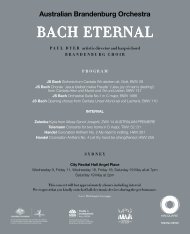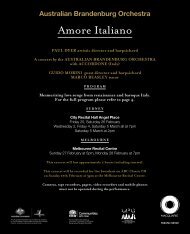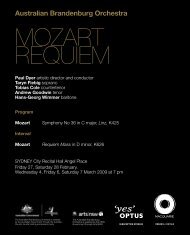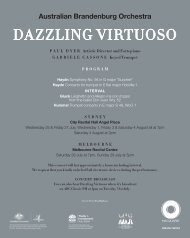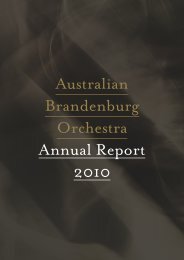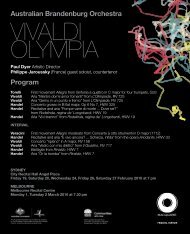download PDF program - Australian Brandenburg Orchestra
download PDF program - Australian Brandenburg Orchestra
download PDF program - Australian Brandenburg Orchestra
Create successful ePaper yourself
Turn your PDF publications into a flip-book with our unique Google optimized e-Paper software.
noËl! noËl!<br />
Andrea Gabrieli to become organist at San Marco in 1585, a position he held until his death. He was also the chief<br />
composer of the music required for the many ceremonies and extravagant religious festivals held at San Marco or<br />
in the piazza in front of it (described by Napoleon as “the finest drawing room in Europe”).<br />
Gabrieli is particularly famous for his elaborate motets for multiple choirs, composed to make the most of<br />
San Marco’s galleries and splendid acoustic. This motet was composed in 1597 and is in eight parts, for<br />
two choirs. Its text comes from the Gospel according to Matthew.<br />
Angelus Domini descendit de caelo<br />
et accedens revolvit lapidem,<br />
et sedit super eum<br />
et dixit mulieribus:<br />
Nolite timere<br />
scio enim quia crucifixum quaeritis,<br />
iam surrexit,<br />
venite et videte locum<br />
ubi positus erat Dominus.<br />
Alleluia.<br />
The angel of the Lord descended from heaven<br />
and rolled back the stone,<br />
and sat upon it,<br />
and said to the women:<br />
“Do not be afraid,<br />
for I know that you seek him who was crucified.<br />
He is already risen;<br />
come and see the place<br />
where the Lord was lying.<br />
Alleluia.”<br />
Heinrich Ignaz Franz von Biber (1644-1704)<br />
Praeludium from the “Annunciation” Sonata<br />
Heinrich Biber came from Bohemia, but he spent most of his career in Salzburg, where he was Kapellmeister<br />
(music director) for the Prince-Archbishop. He was renowned as a violin virtuoso and composer of extremely<br />
difficult pieces for the violin. The eighteenth century English music historian Charles Burney said of him: “of all<br />
the violin players of the last century Biber seems to have been the best, and his solos are the most difficult<br />
and most fanciful of any music I have seen of the same period”.<br />
This work is the opening prelude from the first of fifteen sonatas for solo violin and continuo known as the<br />
Mystery or Rosary Sonatas. In Biber’s manuscript each sonata is accompanied by an engraving depicting<br />
one of the fifteen Mysteries of the Rosary (events in the life of the Virgin Mary) - five joyful, five sorrowful and<br />
five glorious. The Annunciation refers to the appearance of the Archangel Gabriel to Mary to tell her that she<br />
was to give birth to the son of God, according to the Gospel of Luke. The beating of the Archangel Gabriel’s<br />
wings can be heard in the swirling semiquavers in the prelude.<br />
Anonymous<br />
Neapolitan Lullaby arr. Aaron Kenny<br />
A ninna nanna is an Italian lullaby. In this traditional song from the south of Italy it is Mary who sings to<br />
the sleeping baby Jesus and foresees his future. This arrangement uses a cornett, not a brass instrument,<br />
but a wooden wind instrument that looks somewhat like a curved recorder with a tiny, trumpet-like<br />
mouthpiece. It was used mainly from the fifteenth to the seventeenth century, but went out of fashion during<br />
the eighteenth century partly because it was so difficult to play. Its velvety sound has been described as<br />
being most like the human voice of any instrument.<br />
Ninna nanna, ninna nanna,<br />
dormi figlio, dormi amore.<br />
Con quel pianto e quella voce<br />
brami, ohimè, brami la croce.<br />
Or ch’è tempo di dormire<br />
Lully lullay,<br />
sleep my son, sleep my love.<br />
With those tears and that voice<br />
you call, alas, for the cross.<br />
Now that it is time for sleep,<br />
Quella bocca pien di miele<br />
brama latte aceto e fiele.<br />
Or ch’è tempo di dormire<br />
vera il tempo del partire,<br />
verrà il tempo del dolore.<br />
Dormi amore.<br />
Altri pecca e tu ne piangi,<br />
e la vita in morte cangi,<br />
e ne godi nel dolore.<br />
Per dar vita al peccatore<br />
complirai questo desio.<br />
Dormi, o Dio.<br />
That mouth full of honey<br />
longs for milk, vinegar and gall.<br />
Now that it is time for sleep,<br />
sleep, my son, and don’t cry,<br />
the time for sadness will come.<br />
Sleep, my love.<br />
For the sins of others you weep,<br />
and you exchange your life for death<br />
and rejoice in suffering.<br />
To give life to sinners<br />
you will fulfil this desire.<br />
Sleep, oh God.<br />
TRADITIONAL<br />
Italian Song (based on la Carpinese) arr. Aaron Kenny<br />
The Carpinese is a traditional shepherds’ tune from Carpino, a town in the Pugliese region on the north<br />
coast of southern Italy. This ancient folk melody has been arranged by Sydney composer Aaron Kenny<br />
for our Christmas series. Tonight the text reflects the love of a mother for her child.<br />
Maria,<br />
O di senteli gridà,<br />
ci portanu l’angunia<br />
chi l’ora hè venuta avà<br />
Maria,<br />
O tempu un ne ferma più<br />
a morte è cusì sia<br />
u to figliolu Ghjesù<br />
Tandu penserai à tanti ghjorni è tanti mesi<br />
per ghjunghjene oghje à tamanti malani<br />
è per ch’ella sia più dolce la toia offesa<br />
Maria, avà n’un ti scurdà<br />
Da li primi passi soi à la prima parolla<br />
eri tù la mamma d’ogni stonda è d’ogni pientu<br />
è più che la vita un si trova più bella scola<br />
Maria, l’ora hè venuta avà<br />
Maria,<br />
O li sentu avvicinà,<br />
avanzanu per la via<br />
un hè più tempu à pensà<br />
Maria,<br />
sò ghjunti à piglià Ghjesù,<br />
cusì duru ch’ella sia<br />
speranza un ne ferma più<br />
Da li primi passi soi à la prima parolla<br />
eri tù la mamma d’ogni stonda è d’ogni pientu<br />
è più che la vita un si trova più bella scola<br />
Maria, l’ora hè venuta avà<br />
Mary,<br />
Oh hear the cries<br />
that herald the agony<br />
for now the hour is come.<br />
Mary,<br />
time will not stand still<br />
for death and so it is<br />
for your son Jesus.<br />
Think of how many days and months<br />
led to this calamitous day;<br />
to soften your sorrow<br />
Mary, don’t forget any of them.<br />
From his first steps and words<br />
you, his mother, were always there, and heard every cry.<br />
There is no better school than life.<br />
Mary, the hour has come.<br />
Mary,<br />
I hear them coming,<br />
coming along the road;<br />
there is no more time for memories.<br />
Mary,<br />
they have come to arrest Jesus:<br />
it is so hard<br />
that there is no more hope.<br />
From his first steps and first words<br />
you, his mother, were always there,and heard every cry.<br />
There is no better school than life.<br />
Mary, the hour has come.<br />
forza<br />
Quandu a raggione hè vinta sola da la When reason is beaten by force<br />
dormi figlio e non vagire,<br />
sleep, my son, and don’t cry,<br />
tandu un arrega che dulore è scimita<br />
one can expect only pain and folly.<br />
12<br />
verrà il tempo del dolore.<br />
the time for sadness will come.<br />
è l’omi sò qui portanu dolu è viulenza<br />
The men have brought pain and violence.<br />
Dormi amore<br />
Sleep, my love.<br />
Maria, nimu un li parerà.<br />
Mary, nothing will stop them.<br />
13



